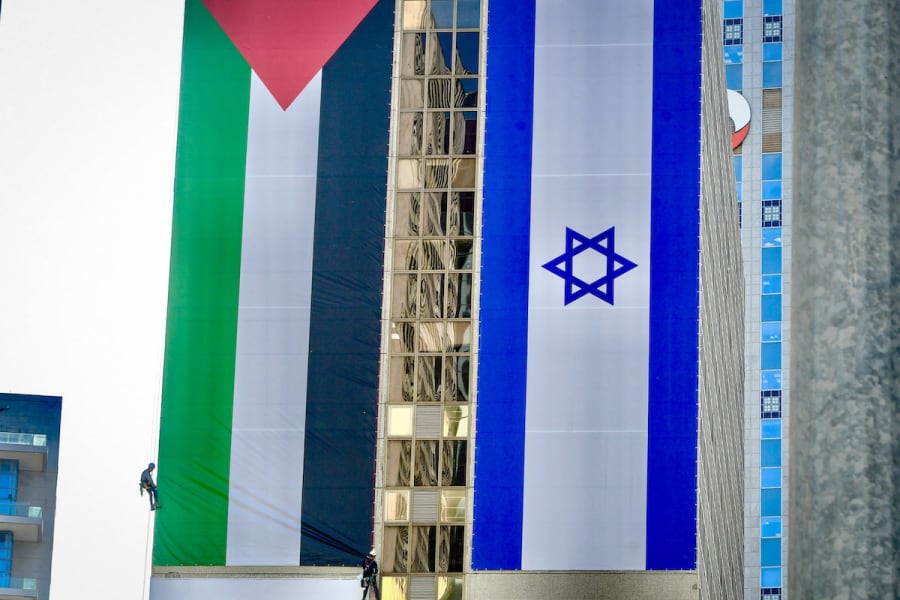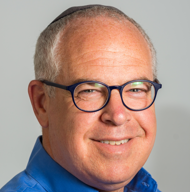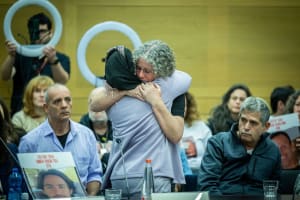Can economic interests be a foundation for peace between Israelis and Palestinian Arabs anymore?

My heart breaks every day when news anchors begin their programs by announcing that “the following names of soldiers killed in combat have been cleared for publication,” after notification of their loved one’s deaths: sons, daughters, siblings, spouses, and parents. The death toll and the repercussions are devastating.
It’s scary. With over 100 soldiers killed since the beginning of the war, we listen for names of people we know, or related to people we know. It’s a small country, so for my family that’s happened several times.
We listen to find out what units the soldiers were in to try to discern something about our son’s unit. Is he coming under fire and losing soldiers around him? Is he safe? Scared?
The war is far from over. That’s scary, too.
Many Hamas terrorists have been killed and many more arrested. Recently, many are surrendering, placing their lives over their genocidal antisemitic ideology.
Before Oct. 7, tens of thousands of Gazans worked in Israeli communities on a daily basis. They earned a good salary, received benefits, and worked with people who believed that working together was a cornerstone of building a foundation for eventual peace.
With many of the Hamas terrorists who committed the Oct. 7 massacre either being the same people who worked in the Israeli communities, or who received intelligence briefings from them, another casualty of the war is that it will be a very long time, if ever, that Palestinian Arabs from Gaza will ever work in Israel again.
Living in the Judean mountains, pejoratively referred to as the “West Bank,” the issue of working among our Palestinian Arab neighbors is at the forefront of most of our minds too.
From my apartment window, I see a modest white building that, until Oct. 6, served as “the worker’s gate.” Before then, dozens of Arabs' cars would park on the dirt lot every morning. They would bring their ID and lunch, pass through a rudimentary security check and metal detector, and come to work in my town. Hundreds of men and women.
I’d joke that on an average weekday, there were more Palestinian Arab men working here than Jewish men.
My apartment is closer to the adjacent Palestinian Arab village than any Israeli community that was overrun by terrorists on Oct. 7 was close to the Gaza border. We have no fence separating us. One kilometer away I see the mosque, and an elementary school emblazoned with pictures of the Palestinian flag, and their terrorist hero leader, Yasser Arafat.
If they wanted to, there’s virtually nothing stopping them from invading our community with thousands of terrorists. Hundreds of people live in my apartment complex. Hundreds more across the street. The elementary school behind my apartment is a four-minute walk.
How does anyone know that they’re not using the “Yasser Arafat” school across the way to stockpile weapons and from which to plan Israel Slaughter 2.0?
A jarring survey this week by the Palestinian Center for Policy and Survey Research among Palestinian Arabs highlighted our reason for concern.
Over 70% of Palestinians in the “West Bank” and the Gaza Strip support Hamas' decision to conduct the Oct. 7 massacre, yet paradoxically the vast majority do not believe that Hamas carried out atrocities during the massacre.
In the “West Bank,” our neighbors, 82% believe that Hamas' decision to launch the attack was correct. Only 12% said it was incorrect. In Gaza, 57% said it was correct and 37% said it was incorrect.
85% of “West Bank” Palestinian Arabs were satisfied with Hamas' behavior in the war, yet only 52% of Gazans felt the same.
85% said that they did not see videos showing the atrocities committed by Hamas against Israeli civilians on Oct. 7. Accordingly, only 7% said that they believed that Hamas committed such atrocities.
Despite not seeing any of the terrorists’ own videos, 95% of Palestinian Arabs believe Israel has committed war crimes, while only 10% said that Hamas has committed war crimes.
Looking for an excuse to justify the massacre that most don’t believe actually took place, yet which they are happy about, the majority said they believe the massacre took place as "a response to settler attacks on al-Aqsa Mosque and on Palestinian citizens and for the release of prisoners from Israeli prisons." 14% thought it was an Iranian plot to thwart Arab normalization with Israel.
When asked who they want to see controlling Gaza after the war, 75% of “West Bank” residents (our neighbors again) said Hamas, while only 38% of Gazans said the same. About 72% said they believe Hamas will return to control Gaza after the war.
Early Zionist leader Ze’ev Jabotinsky, wrote that in order for Zionists to succeed in settling the Land of Israel and to build a society, they must create an “Iron Wall” to prevent Arab ambitions to eradicate the pre-state Zionist movement. Ironically, Israel has called this war “Operation Iron Swords.”
Perhaps prophetically, Jabotinsky proposed: “I do not mean to assert that no agreement is possible with the Arabs of the Land of Israel. But… as long as the Arabs preserve a gleam of hope that they will succeed in getting rid of us, nothing in the world can cause them to relinquish this hope, precisely because they are not a rabble but a living people. And a living people will be ready to yield on such fateful issues only when they have given up all hope of getting rid of the alien settlers. Only then will extremist groups with their slogans ‘No, never’ lose their influence, and only then will their influence be transferred to more moderate groups. And only then will the moderates offer suggestions for compromise. Then only will they begin bargaining with us on practical matters, such as guarantees against pushing them out, and equality of civil and national rights.”
The problem is that based on the recent poll, and our instincts, there are no moderates. There are no peace partners. And we look at our Palestinian Arab neighbors more and more not as people with whom we can peacefully coexist, but as a wholesale threat to us, our families, our communities, and our country.
That’s another casualty of the war. Even people like me, who believed in economic opportunities as a cornerstone for peaceful coexistence, are nervous and second-guessing everything we believed. Many neighbors say they will never have a Palestinian Arab worker in their house again.
It’s become a political issue as well. National municipal elections were to have taken place in November. They have been pushed off indefinitely. Our current mayor has stated he wants to bring back the Palestinian Arab workers. The pushback has been fierce. The main concern is that doing so puts the economic well-being of our Arab neighbors over our safety. With no proof that working together advances peace, and actual proof that we don’t know which if any Arab neighbors we can trust, very few want to take the risk, even if that means renovations in their homes taking longer or costing 50% more.
The same is true for how and where we shop in Arab-owned businesses, or Jewish-owned businesses that employ Palestinian Arabs.
Before Oct. 7, there wasn't peace, not necessarily love, but there was human respect and respectful coexistence. One of the casualties of the war is that much of that is gone. There are many stories of the impact and it’s not good for anyone.
“Mohammed,” a Palestinian Arab who has worked in my home and the homes of many others, has been appealing to many of my neighbors for food, clothes and money for his family because he no longer has a way to work. Few have responded favorably.
Nobody wants their home attacked, their wives and daughters raped, any of us burned alive or beheaded, and we no longer know who we can trust, and most of us don’t want to take that risk.

Jonathan Feldstein was born and educated in the U.S. and immigrated to Israel in 2004. He is married and the father of six. Throughout his life and career, he has become a respected bridge between Jews and Christians and serves as president of the Genesis 123 Foundation. He writes regularly on major Christian websites about Israel and shares experiences of living as an Orthodox Jew in Israel. He is host of the popular Inspiration from Zion podcast. He can be reached at [email protected].






